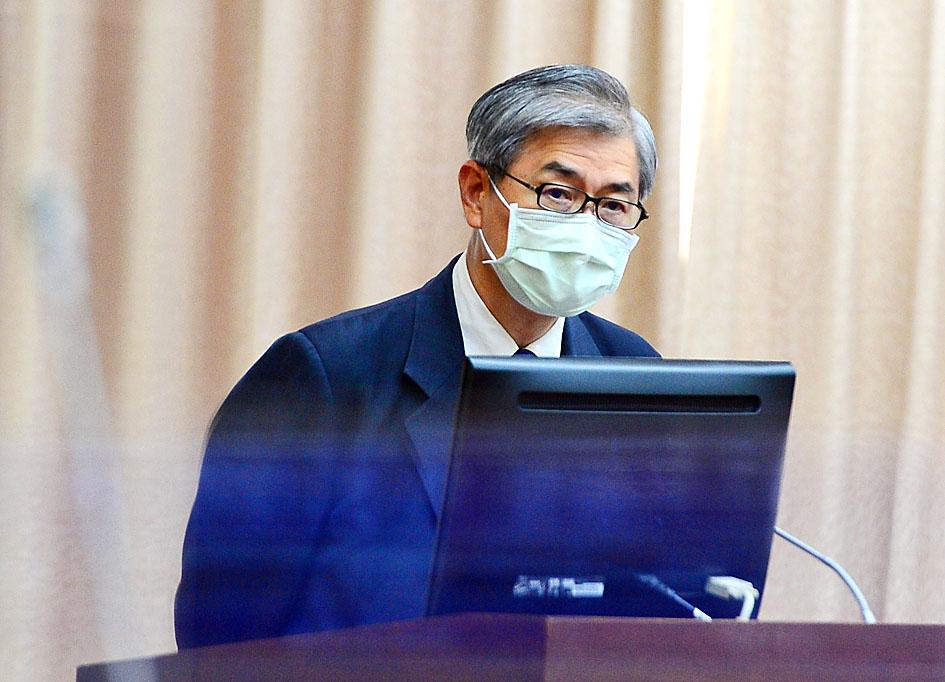Publicly traded companies might be allowed to delay their annual shareholders’ meetings until after next month given a surge in COVID-19 infections in Taiwan, Financial Supervisory Commission (FSC) Chairman Thomas Huang (黃天牧) said yesterday.
The commission would speak with the Ministry of Economic Affairs and the Ministry of Health and Welfare to reach a decision within two weeks, Huang told a meeting of the legislature’s Finance Committee in Taipei.
The Securities and Exchange Act (證交法) requires listed companies to hold their annual general meetings by the end of June or face a fine of NT$240,000 to NT$4.8 million (US$8,577 to US$171,539).

Photo: Wang Yi-sung, Taipei Times
The commission would look to the Special Act for Prevention, Relief and Revitalization Measures for Severe Pneumonia with Novel Pathogens (嚴重特殊傳染性肺炎防治及紓困振興條例) and study whether listed firms could be exempted from the requirements of, Huang said.
“The advantage [of delaying meetings] would be to reduce public gatherings and help contain the spread of COVID-19, but delaying them would affect stock-related affairs, such as dividend distributions,” he said.
Listed companies are required to announce their book closure dates at least 60 days before their shareholder meetings so they can finalize their shareholder rosters.
Only shareholders on the roster are eligible to attend the meetings.
If companies are permitted to delay the meetings to later than next month, they might need to reschedule the book-closure dates, which would also affect shareholders’ interests, Huang said.
The commission would weigh the pros and cons, he said.
Democratic Progressive Party Legislator Shen Fa-hui (沈發惠) told the committee meeting that many nations and other administrations have allowed firms to postpone shareholders’ meetings amid the pandemic, including China, Dubai, France, Germany, Singapore, Thailand, the UK, the US and Vietnam.
The commission is also mulling whether companies should be allowed to hold shareholder meetings via videoconferencing, but there are some technical issues.
Companies would find it difficult to authenticate shareholders’ identities online and count their real-time votes, Securities and Futures Bureau Deputy Director-General Tsai Li-ling (蔡麗玲) said on Tuesday.
Another problem is whether videoconferencing software allows sufficient overlapping log ins, Tsai said.
Moreover, if a videoconference breaks up or there is a bad connection, it would compromise shareholders’ rights, she said, adding that it is foreseeable that “controversies would occur.”
In related news, the commission said that the nation’s financial services would remain normal even if the COVID-19 alert is raised to level 4, while banks are encouraged to lower handling fees, as people would use online banking services and ATMs more instead of going to branches.

Taiwan Semiconductor Manufacturing Co (TSMC, 台積電), the world’s biggest contract chipmaker, booked its first-ever profit from its Arizona subsidiary in the first half of this year, four years after operations began, a company financial statement showed. Wholly owned by TSMC, the Arizona unit contributed NT$4.52 billion (US$150.1 million) in net profit, compared with a loss of NT$4.34 billion a year earlier, the statement showed. The company attributed the turnaround to strong market demand and high factory utilization. The Arizona unit counts Apple Inc, Nvidia Corp and Advanced Micro Devices Inc among its major customers. The firm’s first fab in Arizona began high-volume production

VOTE OF CONFIDENCE: The Japanese company is adding Intel to an investment portfolio that includes artificial intelligence linchpins Nvidia Corp and TSMC Softbank Group Corp agreed to buy US$2 billion of Intel Corp stock, a surprise deal to shore up a struggling US name while boosting its own chip ambitions. The Japanese company, which is adding Intel to an investment portfolio that includes artificial intelligence (AI) linchpins Nvidia Corp and Taiwan Semiconductor Manufacturing Co (TSMC, 台積電), is to pay US$23 a share — a small discount to Intel’s last close. Shares of the US chipmaker, which would issue new stock to Softbank, surged more than 5 percent in after-hours trading. Softbank’s stock fell as much as 5.4 percent on Tuesday in Tokyo, its

COLLABORATION: Softbank would supply manufacturing gear to the factory, and a joint venture would make AI data center equipment, Young Liu said Hon Hai Precision Industry Co (鴻海精密) would operate a US factory owned by Softbank Group Corp, setting up what is in the running to be the first manufacturing site in the Japanese company’s US$500 billion Stargate venture with OpenAI and Oracle Corp. Softbank is acquiring Hon Hai’s electric-vehicle plant in Ohio, but the Taiwanese company would continue to run the complex after turning it into an artificial intelligence (AI) server production plant, Hon Hai chairman Young Liu (劉揚偉) said yesterday. Softbank would supply manufacturing gear to the factory, and a joint venture between the two companies would make AI data

The Taiwan Automation Intelligence and Robot Show, which is to be held from Wednesday to Saturday at the Taipei Nangang Exhibition Center, would showcase the latest in artificial intelligence (AI)-driven robotics and automation technologies, the organizer said yesterday. The event would highlight applications in smart manufacturing, as well as information and communications technology, the Taiwan Automation Intelligence and Robotics Association said. More than 1,000 companies are to display innovations in semiconductors, electromechanics, industrial automation and intelligent manufacturing, it said in a news release. Visitors can explore automated guided vehicles, 3D machine vision systems and AI-powered applications at the show, along